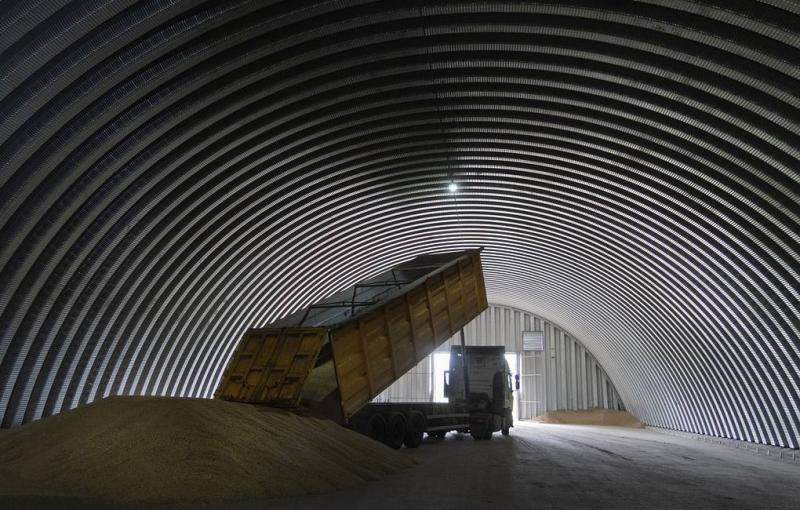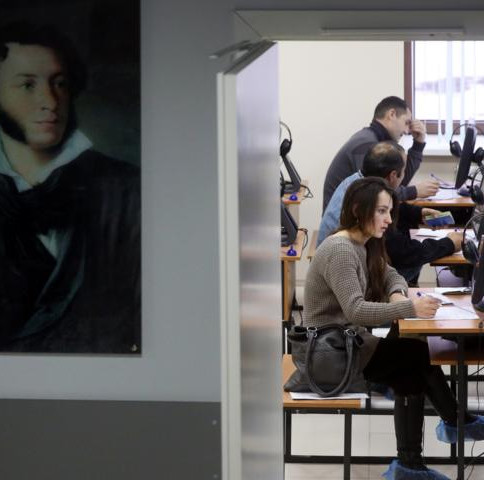
© AP Photo/Efrem Lukatsky/TASS
Top stories from the Russian press on Tuesday, March 14th, prepared by TASS
Moscow agrees to extend the grain deal for 60 days only, Australia will acquire nuclear submarines under the AUKUS partnership, and the Chinese leader is expected to make a symbolic visit to Russia. These stories topped Tuesday’s newspaper headlines across Russia.
Kommersant: Russia agrees to shorter grain deal extension
Moscow has decided not to object to extending the grain deal after March 18, when the previous agreement expires, but only for a 60-day period instead of 120 days. Russian Deputy Foreign Minister Sergey Vershinin described the Geneva consultations with the United Nations as difficult and said that in two months’ time, Russia would re-evaluate the situation based on whether or not its global exports are unblocked.
According to Sovecon Director Andrey Sizov, the chances of a further extension of the Black Sea initiative remain high, while Russia might have insisted on 60 days only to exert pressure to achieve its goals of reconnecting Rosselkhozbank to SWIFT and unblocking the Togliatti-Odessa ammonia pipeline.
The news on the grain deal remains significant for market players, Director General of the Institute for Agricultural Market Studies Dmitry Rylko underscores. Russia’s statement is unlikely to have an impact on global prices, which are still declining for various reasons, the expert said. To him, the 60-day period may have something to do with the May 14 presidential and parliamentary elections in Turkey, after which discussions on the terms for the grain deal might change, given Turkish President Recep Tayyip Erdogan’s role in the process.
Director of the Center for Modern Turkish Studies Yury Mavashev agrees as he sees a certain curtsey toward Erdogan in Russia’s decision to extend the deal for only two months. "Something like, we are looking forward to your victory and we may decide not to reach agreements with anyone, if you lose," he told Kommersant.
Meanwhile, the latest polls show that the positions of both Erdogan and the ruling party ahead of the vote are quite shaky and that the incumbent government and its rivals stand an equal chance of winning.
Rossiyskaya Gazeta: Australia to receive nuclear submarines from US, Britain
On Monday, US President Joe Biden met with British Prime Minister Rishi Sunak and Australian Prime Minister Anthony Albanese in San Diego, where the three leaders considered supplying US-and British-manufactured nuclear submarines to Canberra. At least eight nuke subs are expected to be built in Adelaide.
The talks may seemingly pave the way for a new stage in the trilateral AUKUS partnership. The Anglo-Saxon defense alliance, dubbed as "Asian NATO" by some experts, is seen as an effort to counter China.
London has already announced plans to ramp up its defense spending. "The 2023 Integrated Review Refresh [IR23] confirms that an additional Ј5 billion will be provided to the Ministry of Defense over the next two years to help replenish and bolster vital ammunition stocks, modernize the UK’s nuclear enterprise and fund the next phase of the AUKUS submarine program," the British PM’s office said on its website. Beijing has warned that the steps being taken under the AUKUS security pact will provoke a regional arms race.
Leading researcher of the Center for Prospective American Studies at the Russian Foreign Ministry’s MGIMO University Igor Istomin told Rossiyskaya Gazeta that the deal to jointly build nuclear submarines with Australia attracts additional attention, because not many countries have a nuclear submarine fleet. Today, six countries use such submarines, and if Australia gets them, it will join the list. This would risk violating the NPT as quite substantial nuclear technology and capabilities would be transferred to a non-nuclear country, he warned. The United States and Great Britain say that though nuclear-powered submarines will be given to Australia, they will be equipped with conventional weapons. However, specific details raise lots of questions, the expert said.
Nezavisimaya Gazeta: China’s Xi expected to make symbolic visit to Russia
The 14th National People’s Congress concluded its first session on Monday. Chinese leader Xi Jinping, who was re-elected to a third term, has promised to live up to the trust of the electorate, while focusing on efforts to push the economy forward and rebuff pressure from the outside, meaning the United States. Neither Xi nor China’s new Premier Li Qiang mentioned Russia in their speeches.
However, just like in any other country, authorities in China do not discuss everything openly and they sometimes allow leaks. These include a Reuters report saying that Xi will visit Russia next week. His visit will take place sooner than expected, and the news is important, for it is China who proposed a peace plan for Ukraine. Since Beijing has been providing diplomatic support to Moscow, the West was skeptical about the peace plan. And neither the Kremlin nor the Chinese Foreign Ministry has yet confirmed the dates of the visit.
Scientific Director of the Russian Academy of Sciences’ Institute of China and Contemporary Asia Alexander Lukin told Nezavisimaya Gazeta that visits are paid every year, but that they were postponed during the pandemic. "Now, it’s the Chinese leader’s turn to visit Russia. This is fine. Of course, the international situation has changed. I think, they will discuss this as well as the political and economic cooperation which has been growing by leaps and bounds in price terms. Often, new contracts get signed and new gas or oil pipeline projects are approved during such visits," Lukin said.
To him, it is whether Xi will come at all that matters most. "It has been a tradition with new Chinese leaders to make their first foreign visit to Russia. Xi’s predecessor Hu Jintao and Xi himself did so. <…> The visit would be a symbolic gesture, showing that Russia is the most friendly country for China," Lukin concluded.
However, the South China Morning Post said that Russia’s special military operation has harmed China’s national interests.
Media: Experts weigh in on how failing US banks may affect global markets
The experts interviewed by Izvestia see signs of a systemic failure behind the closure of three large US banks and the falling shares of US lenders. Though there is no sign of a potential global crisis yet, they warned, a worst-case scenario could aggravate things for the US and global financial systems, and the EU would be hit the hardest due to its close links with the US economy. Meanwhile, it would be less of a shock for the isolated Russian economy.
On Monday, Biden assured the Americans that the US banking system and their deposits were safe in the wake of the failures of Silicon Valley Bank, Signature Bank and Silvergate Capital in the past two weeks. The market responded negatively to the US leader’s statement and stocks accelerated their losses. The turbulence on the US market spilled over to EU platforms, while the Russian market was mixed.
Biden’s address itself showed that the United States is facing a financial crisis similar to the 2008 crash, Vladimir Vasiliev, chief researcher at the Russian Academy of Sciences' Institute for US and Canadian Studies, told Vedomosti. Given the government’s intentions to help bank clients and consumers rather than bank leaders, it can be concluded that Washington will not be seeking to support lenders, therefore Biden’s speech may aggravate things for the banking system, Vasiliev concluded.
Failures at large US banks always affect global financial markets, Agvan Mikaelyan, a board member at FinExpertiza, a network of professional audit and consulting firms, said in an interview with Izvestia. According to him, the shuttered banks played a major role in venture investments, so their failure will to some extent affect the technological development of the US. However, he expects no significant consequences globally unless top ten US lenders fail.
To Deputy Head of Investment Analysis at Tinkoff Investment Andrey Oparin, this looks like a liquidity crisis that may evolve rapidly. In an interview with Vedomosti, he said regulators need to react quickly in order to prevent a domino effect. If the government measures being taken now are not enough, the whole economy may be at risk, as it was in 2008, concurs international stock market analyst at BCS World of Investment Igor Gerasimov.
Vedomosti: Global arms market seeing tectonic changes
On March 13, the Stockholm International Peace Research Institute (SIPRI) published an annual report on international arms sales for 2013-2017 and 2018-2022, which lists Russia as the second largest arms exporter behind the United States.
Prokhor Tebin, an expert with the Center for Comprehensive European and International Studies at the Higher School of Economics, told Vedomosti that the data from such a respected institute as SIPRI may be considered adequate. And yet, the tightening of the anti-Russian sanctions in recent years, especially following the adoption of the American CAATSA law in 2018, increased competition in the arms market and the conflict in Ukraine make any objective analysis in the sphere very difficult. SIPRI collects data from open sources, while military-technical cooperation has been getting increasingly secret globally, the expert underscored.
The methods used by SIPRI cannot be seen as corresponding to reality, Andrey Frolov, an expert with the Russian International Affairs Council, argues, as they are very conditional and controversial. Besides, the institute does not have complete data on Russian contracts, the expert added. The weapons market is very volatile, and a large contract may change a country’s position in the ranking, he said. According to Frolov, the situation that has been developing against the backdrop of the special military operation will seriously affect the global market for weapons in the future, but it is too early to say exactly how.









